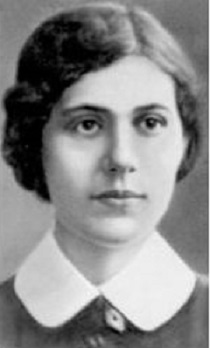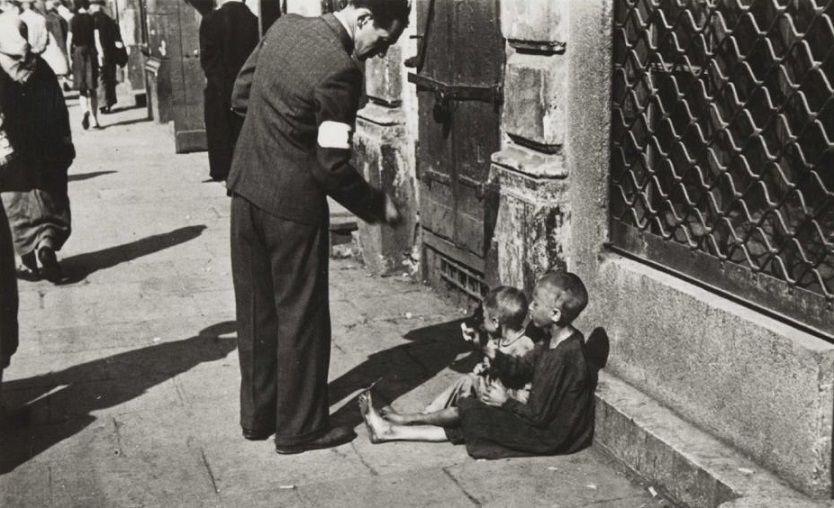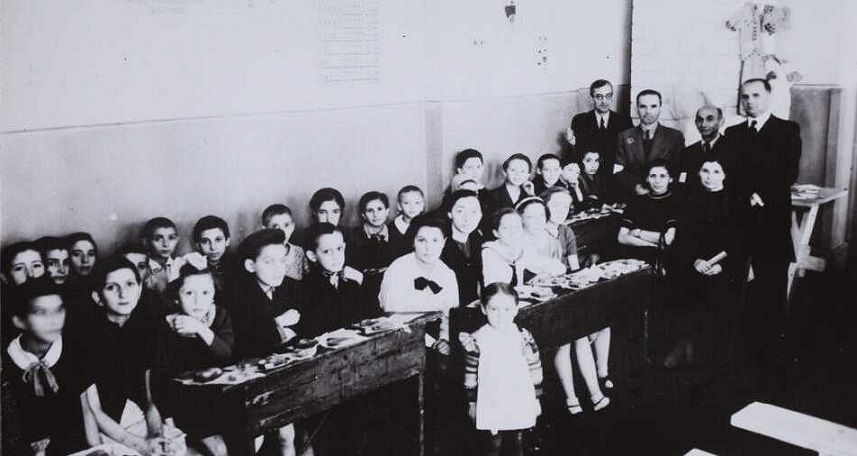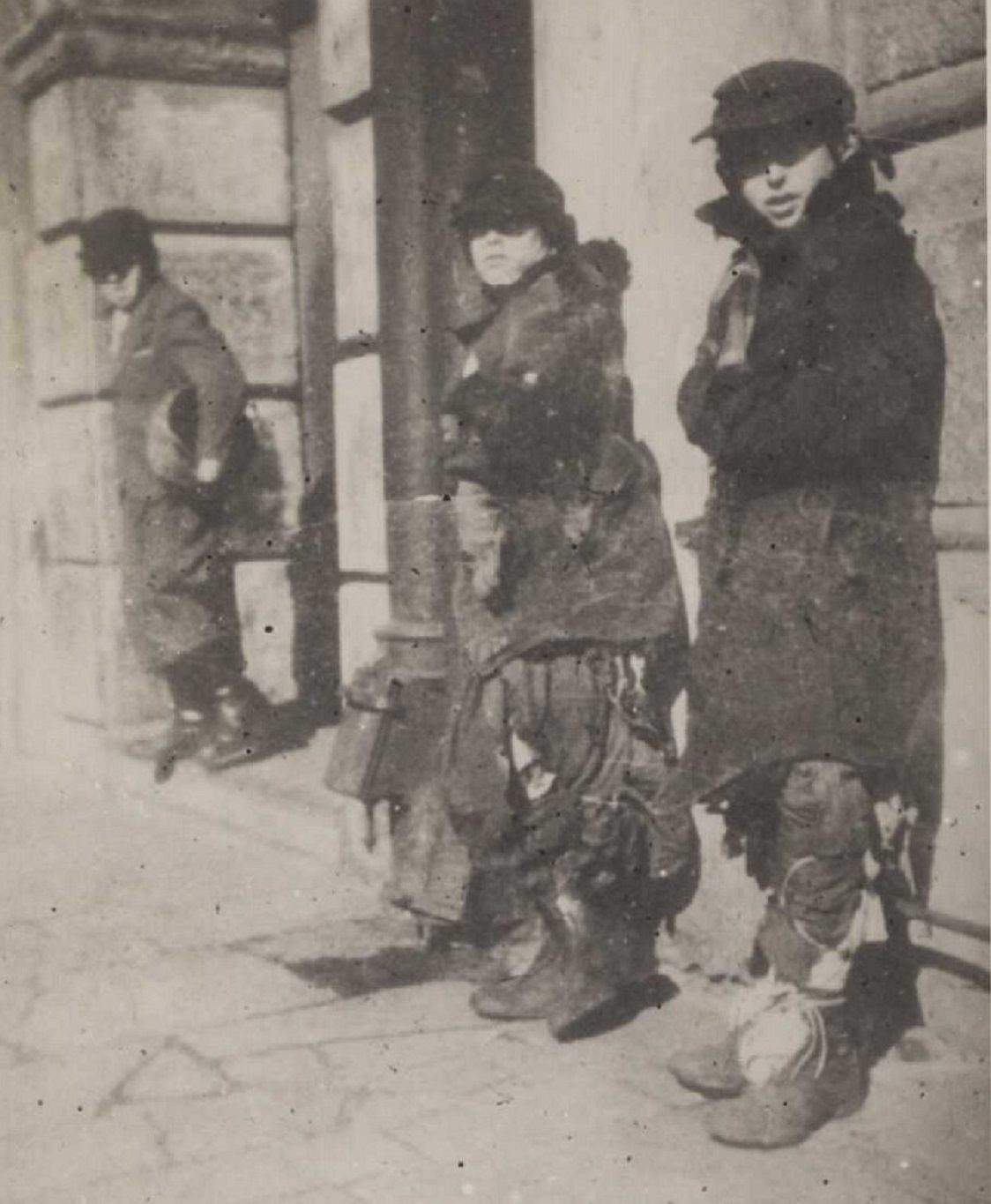Roza Symchowicz (1887 – 1941)
Dr. Roza Symchowicz was born in Slutsk, in the Minsk District of Byelorussia to Parents Shmuel and Zysl Slutsker and in 1896, after her Father’s death, she and her family moved to Minsk. In 1904 at the age of 17, Roza joined the young socialist movement and was soon arrested for seditious tendencies and was released on condition that she leave the Country. This Roza did, and she went to Switzerland and joined the Jean-Jacques Rousseau Pedagogical Institute in Geneva, also enrolling in the Philosophy course at the University of Geneva.
During the period of World War I, 1914 till 1918, Roza spent much of that time in Vienna working with the Children of Jewish refugees. Then in 1919, when she moved to Vilna, Lithuania, Roza began establishing courses that were organized by the Society for the Protection of the Health of the Jewish Community in Poland. Roza began running them also and she was the first manager of the Frebel course to ensure eucation reached more and more. Roza was heavily involved with the Local Lithuanian Jewish Committee for Aid for the Victims of War in Vilna.
“..I met Roza Simkhovitsh ..first time in 1921 ..when I arrived as a pupil at ..Vilna Jewish teachers’ seminary. I noticed a slender ..young Woman ..with an oblong face ..a proud head ..short cut hair ..a pair of flaming ..large ..wise eyes. I have never once in this life forgotten those eyes. ..Each time when I would enter her room ..my heart beat with a special impetuousness. It was not fear. It was ..sense of reverence ..feeling of solemnity that you experienced every time when you met eye to eye with Roza Simkhovits.” Feyge Barakin-Melamdovitsh.
Again we see Roza immersing herself in the needs of their refugee Children and here in 1921 she took over the leadership of the Jewish Teacher seminary in Vilna. Roza now played a more prominent role in the establishment of the Yiddisher school movement. Generally though, as she reported upon the essentials of Pedagogical and Historical lessons to be had at the Vilna People’s Auditorium, she was more keenly interested in all aspects of Children’s Education. In this, Roza sought how best to deliver to all Children their essential needs in education. #Roza was an active participant in the many Teaching Conferences and Educational programmes set to establish good practice amongst all independent Schools. In 1923 she had to leave Vilna in part due to her apparent brush with Minsk sensitivities over her Social concerns and for some time she lived in Vienna, later moving to Berlin. Roza was offering assistance to the Pedagogical Section of the YIVO Institute.
This is when Roza came into contact with the more secular of Jewish Schools, introducing them to educating in Warsaw, Poland taking charge of the Pedagogy and Psychology Department of the Ciszo, the Central Jewish School Organization. Here, Roza developed a fondness for Warsaw itself and was to become the co-editor of 2 Papers, the Pedagogical Monthly, The New School and another was the School and Home. Amongst her essays written for these Publications are Jan Amos Komenski, Definitions of Things for Children and Thoughts on the Publications of our Kindergarten.
In 1926, Roza’s Brother Jakub died, while Teaching at the Jewish Gymnasium School in Lodz, Poland and Roza settled into life Educating and delivering future prospects to her Students. At an International Pedagogical Congress, held in Paris in 1937, Roza representing Ciszo, was presenting her report on the new Yiddish School system. Roza was also assisting in organizing the Jewish pavilion at the World’s Fair in Paris. For whatever reason, losing faith in teaching, as she felt the underfunding hampered Children’s futures, she approached a period of impoverishment, giving tuitions privately to language students.
“..Officials ..are setting up barriers in offices in order to stay separated from ..Street Children and to avoid dangerous lice ..carriers of typhus. ..great friend of Children ..an angel of Earth ..compassionate in suffering ..Roza Symchowicz doesn’t understand how one could ..from human ..pedagogical point of view ..separate themselves from Children ..these poor lambs seeking support from Centos. She does not agree to install a barrier between her and ..Street Children. When these heartbroken Children were coming to Roza ..she was stroking their heads ..supporting them and helping to ..extent she could.” Emanuel Ringelblum.
Then, at the time of the Nazi occupation of Poland, September 1st. 1939, Roza was contributing to an under ground network educating Jewish Children who were now removed from the School environment. When Roza moved into the Warsaw Ghetto she once again became a huge contributer to the illegal schooling taking place. Roza became the leader of the Teacher Seminary and was active in the Jewish Social self help community, returning to what everyone considered was her main focus in life, the Jewish Children in need of her.
“..We had been living at 33 ..Chlodna Street. ..One night 11:00 o’clock. ..A ring at ..doorbell. ..releieved to see Korczak. ..he wanted me to help him organise a series of lectures for ..Children. He produced a list ..of well known People who had agreed to give talks ..Dr. Schiper ..historian ..Stein ..philosopher ..Rosa Simchowitch ..educationalist ..Emanuel Ringelblum ..future brilliant founder of ..Warsaw Ghetto archives.” Michael Zylberberg.
It has been so well articulated and expressed that Roza Symchowicz was ‘the closest friend of a Jewish Child’ and at a time when Jewish Children needed a friend. Then, when we accept that some 1,500,000 Jewish Children were taken out of their Homes and Murdered, Jewish Children were in greater need of a friend than we’d imagine. For Roza, a Teacher of implacable diligence, it was not enough that she tutored and educated, but that she used her position to be actively concerned, and this is where she becomes the socially minded member of her community we come to recognise.
“..despite suffering from hunger ..she was giving her breakfast to ..Children. She has a special love for them ..talks to them like a loving Mother.” Lea Rotkop.
Roza dedicated her entire life to Jewish Children and in the Warsaw Ghetto, this is where she helped the Jewish Orphan Children, and all of those living off of the streets, to feel a little less alone. But Roza soon descended to that same street level of the poverty that engulfed her Children, even refusing the food she was delivered in order to feed the Children in her charge. The Children’s Library at 67 Leszno Street, Warsaw, Poland was dedicated to Roza and named after her during the Autumn of 1941.
It was often suggested that Roza must separate herself from her charges, in order for her to avoid the debilitating illnesses that were squashing these Young lives out of all existence. It is a sickening state of affairs for those Jews of the Warsaw Ghetto that since the beginning of the year 1941, some 13,000 Jews had starved to Death and this was barely 6 months into the year in the Warsaw Ghetto. It is difficult to imagine that on any given month 2,000 Jews in the Ghetto would expire due to lack of Food, and many of these were Children.
“..Tall ..slim ..with a kind ..friendly face ..silver dusted hair ..about 50 years old. Thanks to her Teaching skills ..she was working for a longtime for Ciszo. ..travelling between Cities ..Towns ..telling Jewish Teachers how to love Jewish Children and bring them up in ..spirit of secularism and humanism. Deeply in love with Jewish past ..she wanted to link it with present day. Humble ..quiet like a mouse ..she walked around lost in thought ..like a human being from another planet. It’s impossible to describe directly how much secular Jewish Education in Poland owes to her ..especially in ..countryside ..where Teachers drew so much from her rich experience ..her exceptional knowledge in ..field of upringing problems ..but above all ..from her vast intuition. She was a born Teacher. ..she dedicated herself completely to ..World of Children.” Emanuel Ringelblum.
But Roza was not in the least bit amiable to the suggestion of being helped or fed ahead of those who needed to be helped more than she felt she was and so she stuck rigidly to the model of Educating and Social Concern she had set for herself. Roza was responsible in securing for so many Children of the Warsaw Ghetto at least a hope that they were not really alone. Sadly, Roza soon became infected with typhus and even now refused assistance from Jewish organisations, and in favour of other’s more worthy than herself, as she perceived things, placed herself at the back of the queue.
“..Symchowicz is qualifying candidates ..hearing every Child separately ..getting to know them ..eventually she directs them to boarding houses. Children of ..Street are dirty ..infected with lice ..most of them suffer from typhus.” Emanuel Ringelblum.
Roza died on November 30th. 1941, with typhus taking her in the midst of the worsening conditions for all the Jews within the Warsaw Ghetto. Roza was buried on December 2nd. 1941 in the Jewish Warsaw Cemetery. Children, sitting in the Library named after her could be audibly heard sobbing, crying over her loss, long after Roza had been taken from us. Here, with the obituary to Roza Symchowicz we read:
“..With deep sadness ..we inform you about ..premature death of Roza Symchowicz. With her departure ..contemporary Jewish culture had lost one of its greatest contributors. May we honor her memory. ..funeral will take place on Tuesday December 2nd. 1941 beginning from her home ..Grzybowski square 10.” Her Family and Friends.
100’s of friends and acquaintances came to give ..last goodbyes. Due to strange chance ..hearse with ..body escaped us. ..humble Roza was embarrassed with ..impressive funeral we organized for her ..and ran away. This is how it happened ..we have gathered in ..small Ghetto ..in front of her house ..and walked along with ..hearse. ..small Ghetto ..was linked to ..large Ghetto ..in 2 places. ..pedestrian path led through a wooden bridge over ..Chlodna Street ..which was aryan and divided ..small and ..large Ghetto. Carriages were going down ..aryan side ..on Chlodna Street. We have agreed with ..coach driver that he will wait with us on ..other side of Chlodna. It happened differently. He went directly to ..cemetery ..not waiting for us in ..agreed place. He went directly to ..cemetery ..not waiting for us. Roza’s funeral was probably ..last one with a speech. A small group of friends passed through ..border at ..cemetery ..which was located on ..aryan side. ..JIKOR society published a hectograph paper dedicated to Roza.” Emanuel Ringelblum.
Following on from that there was an announcement about a memorial event that would be dedicated to her and this stated:
“..Dear Colleague ..we would like to invite you to participate in shloshim dedicated to ..memory of Roza Symchowicz ..on Sunday ..January 4th. 1942 ..at 5:00pm at ..ZSS hall ..Tlomackie 5. From the The Ringelblum Archive.





